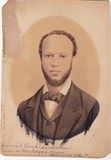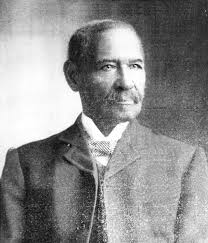
Fortune smiled on many black miners: Gold dust allowed thousands to gain freedom, influence
By Stephen Magagnini
Bee Staff Writer
Published Jan. 18, 1998
For thousands of African Americans, California gold was the great equalizer.
Some came as slaves and bought their freedom with gold dust. Others were freemen who used gold to free their families, fight discrimination and start newspapers, schools and churches.
"This is the best place for black folks on the globe," a miner at the Cosumnes diggings wrote to his wife in Missouri. "All a man has to do is work, and he will make money."
African Americans hit plenty of California pay dirt -- by 1863, they were collectively worth about $5 million (the equivalent of $100 million today). But their real gains came outside the gold fields -- some of Gold Rush California's most influential, educated, daring pioneers were African Americans.
"You had African American newspapers and a number of national leaders," said state librarian Kevin Starr. […]
In 1849, California declared itself "free" and an all-black mining company left New York for the Golden State. "The whole country ... is filled with gold (and) there are but three kinds of individuals that can even work these mines, the Negro, Indian and Irish," said a correspondent to an abolitionist newspaper.
"There are no gentlemen here -- labor rules capital," wrote another. "A darkey is just as good as a polished gentleman and can make more money."
Abolitionist leader Frederick Douglass challenged the separatist American Colonization Society to send blacks to California instead of Liberia.
As early as 1848, white and black abolitionists were staking claims in California. They were joined by black sailors who, like other seamen, deserted en masse and rushed to the gold fields when their ships hit port.
In 1848, a cook named Hector jumped ship in Monterey and returned several weeks later with $4,000 in gold. Another African American made $100,000 in the Tuolumne mines, only to lose it at the gaming tables, one place where blacks were welcome.
In 1851, shortly after the passage of the Fugitive Slave Law, the New Bedford, Mass., Mercury urged its black readers to seek refuge in California. Among those who heeded the call was Jeremiah B. Sanderson, a minister from New Bedford.

Sanderson came west expressly to teach black children, who had no schools. He opened the first black schools in San Francisco, Oakland, Sacramento and Stockton. In 1855, he opened a school for 30 black children in Sacramento, saying, "They must no longer be neglected, left to grow up in ignorance."
Soon after, the Sacramento school board capitulated and built a school for black children.
Sanderson didn't stop there. Backed by other prominent African Americans, he fought hard for the 1874 California law allowing children of all races to attend the same schools.
Mifflin Wistar Gibbs, a friend of Douglass', arrived in San Francisco in 1850 with 10 cents -- enough to buy a cigar -- and the following credo: "Fortune ... may sometimes smile on the inert, but she seldom fails to surrender to pluck, tenacity and perseverance."

Gibbs helped start the city's first shoe store, established California's first black newspaper in 1855, and became the first black judge in American history. His militant Mirror of the Times urged blacks to give up servile jobs and start their own ranches or businesses. […]
Many of California's black pioneers arrived as slaves and worked double-time until they had earned the $1,000 necessary to buy their freedom.
By 1852, more than half of the 338 African Americans in Sacramento were free people.
African Americans operating the Sweet Vengeance mine in Yuba County fought off white claim jumpers, and a delegate to the 1849 statehood convention feared "a black tide over the land -- greater than the locusts of Egypt." […]
The Legislature in 1858 nearly outlawed further black immigration to California. Gibbs and several hundred other African Americans left for a gold strike in British Columbia. There Gibbs was elected to the common council. He later became U.S. consul to Madagascar.